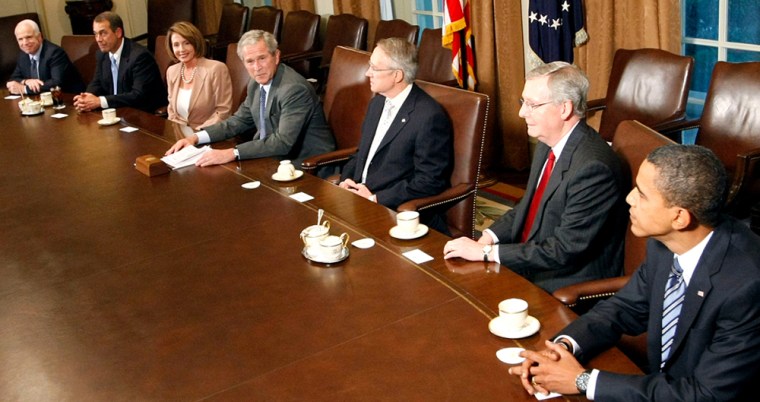With less than a week to go before the presidential election, there’s no question the 2008 race to the White House is hinging on the economy. There is a question, however, about how much power the winner will have to turn the troubled economy around.
With the nation facing its worst economic crisis in decades, economists and historians say it is hard to predict how much sway either Barack Obama or John McCain will ultimately have over the nation’s economic woes. That’s partly because the crisis is moving so rapidly and partly because a new president’s power depends in part on external factors that are difficult to gauge, such as whether he faces a cooperative Congress.
“There are limits on what a president can achieve or do, but the expectations are so great,” said Robert Dallek, a longtime presidential historian.
Still, that’s not to say the president has no power at all, both as a policymaker and as a national leader.
“The first and foremost thing he has is the ability to promote confidence, and that’s an absolutely essential ingredient, it seems to me, of stabilizing the economy and making people more hopeful about the country,” Dallek said. “That’s very much the president’s job.”
Ken Mayland, president of the forecasting firm ClearView Economics, sees plenty of similarities to today’s situation and that of 1992, when the first President Bush was in the White House, the economy was in decline and the Democratic contender, Bill Clinton ran his campaign on the theory that “It’s the economy, stupid.”
“The public wanted change, and the election validated what the public wanted,” Mayland said. Clinton's election boosted both confidence and the stock market, Mayland noted.
This time around, with either candidate poised to replace a deeply unpopular president, Mayland said a change in leadership could have similar results.
The more difficult test of the new president’s mettle — whether he can put forth policies that improve economic conditions — may be dependent on whether he is able to move quickly and with the support of Congress.
“The president is fairly constrained in what he can do without congressional action,” said John Steele Gordon, a business and financial historian.
If a new president wants to make broad changes aimed at boosting the economy, several experts say he’ll also have to move fast. If history is any judge, the president’s power will likely be most potent in the first few months of his presidency.
“Presidents are at their most powerful in the first six months of their first administration,” Gordon said. “Traditionally, that’s when things get done.”'
President Franklin Roosevelt famously spent his first 100 days in office crafting an economic policy that would reverberate for years as the United States worked its way out of the devastating Great Depression. During those first months in office, he faced little opposition from Congress, enjoying the kind of cooperation President Bush received in the days following the terrorist attacks of Sept. 11, 2001.
Still, Gordon thinks economic conditions in the United States would have to worsen considerably for a new president to get that kind of free rein this time around. And, if the president faces stiff congressional resistance, that is likely to severely hamper his ability to take aggressive action.
In that sense, Dallek thinks Obama might have more clout if, as expected, he is working with a Democratic-controlled Congress. But McCain also has a record of seeking bipartisan accord, and Dallek predicts that, if elected, he too would get a "honeymoon period" at the outset of his presidency.
In many ways, several experts said, the president’s most powerful weapon in fighting economic malaise will be the early choices he makes for key Cabinet positions, as well as the other advisers he surrounds himself with.
Perhaps the most important pick will be his choice to replace Treasury Secretary Henry Paulson, who has been the driving force behind the Wall Street rescue plan and has said he will step down at the end of President Bush’s term. With a crisis of this severity, the new Cabinet will need to be ready to move at full speed once the new president is inaugurated.
“What’s going to be striking to people is how quickly the new president will move to name his Cabinet,” Dallek said.
The president also will be facing an anxious public looking to see results soon after he is inaugurated, Dallek said, especially if he has a lot of cooperation from Congress.
“(If), 90 days down the road, he has not delivered, then he’s going to lose a lot of credibility,” Dallek said.
That may be a tough deadline to beat. Mayland, the economist, notes that even the most well-intentioned president may be fighting market and economic forces beyond his control. After all, no president wants to preside over an economy in decline, and yet inevitably declines happen, no matter how much clout the person sitting in the Oval Office has.
“Even with good policymaking, the economy still remains cyclical,” said Mayland, who predicts the economy will start to rebound in the second half of 2009 and into 2010.
One key policy issue the new president will face is whether to completely revamp the investment and banking regulations that were meant to police Wall Street. In the wake of the financial crisis, many placed blame on a system they said was weakened under a push for deregulation.
A substantial regulatory shift could help the economy, but the president faces considerable risk if he puts forth a bold plan — especially if it turns out to be the wrong one.
While good policy decisions can sometimes have only a muted impact on the economy, Mayland notes, “Bad economic policymaking is really bad for the economy.”
